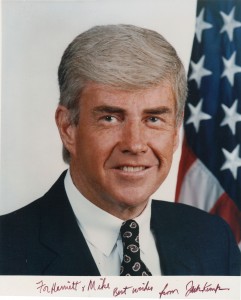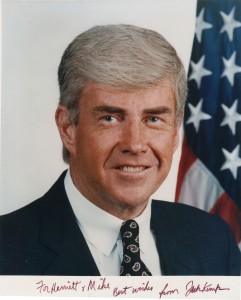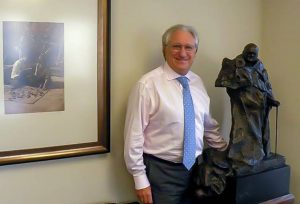Churchill in the News
Jack French Kemp 1935-2009

May 21, 2009
Correrai ancor piu veloce per le vie del cielo
©Richard Langworth
Editor, Finest Hour

2025 International Churchill Conference
21 May 2009

On Eleuthera, where we live from December to April, there was vast fascination, as one might expect, in the recent U.S. Presidential election. One of the virtues of this Bahamas island far out in the Atlantic is that racism, in the sense we all know it in the so-called First World, doesn’t really exist. On our easy-going tropical strand, amid the smiles of welcoming locals and old friends who have known each other for years, it just doesn’t seem to matter whether the face in front of you is black or white.
So it was perfectly natural for the wife of our local grocer to ask me in all innocence and without rancor: “Is it possible for a non-white to be elected President?”…
…And for me to reply without even a thought: “Sure. In fact it was possible twelve years ago, if the ticket had been Colin Powell and Jack Kemp.”
I am firmly convinced it was possible—not only because Colin Powell, Honorary Member of The Churchill Centre, is a man vast numbers of people like or admire; but because Jack Kemp, Trustee of The Churchill Centre, was equally so: a politician who, like Churchill, never wrote off any voter, who believed that his libertarian philosophy could appeal to all, that it was the height of patronization to single out minority groups and declare that they must have more government because they cannot get by with less of it.
Jack was a man who lived life at maximum velocity, whether as championship quarterback for the Buffalo Bills, as a U.S. congressman who promoted enterprise zones in inner cities, as an empowerment-advocating Housing Secretary, or as a candidate for Vice President who described himself as a “bleeding-heart conservative.” But you can read all about those achievements by Googling his name. I would rather write about what he meant to Churchillians.
The Tenth International Churchill Conference in 1993, chaired by Merry Alberigi and held in Washington, was one of our most stellar occasions. We welcomed Lady Thatcher, Winston Churchill, Ambassador Kirkpatrick, Celia Sandys and General Powell. We held a service at the Washington Navy Yard Chapel which duplicated that of Roosevelt and Churchill at Argentia in August 1941, with veterans of USS Augusta and HMS Prince of Wales to read the Lessons. We hosted Ambassador Alan Keyes, who not only sang five national anthems including God Defend New Zealand, but all six verses of The Battle Hymn of the Republic—without music in freezing cold on the steps of the Lincoln Memorial. As Churchill wrote of Argentia: “Every verse seemed to stir the heart. It was a great hour to live.”
Jack Kemp was our keynote speaker at that conference. In the summer 2009 issue of Finest Hour we republish what he said: words of wisdom and inspiration, delivered with the vigor for which he was known, and not without humor. When his introducer made so bold as to compare him to a former congressman named Abraham Lincoln, Jack rose in haste to disclaim even the slightest similarity. After her appreciation following his speech Jeane Kirkpatrick and Jack embraced: old colleagues, veterans of political wars, together again, even though (as Jeane told me at dinner), they had differed fervently over the 1982 Falklands War, with Jack firmly on the side of Margaret Thatcher and Great Britain.
Jack and his gracious wife Joanne were with us again at the commissioning of USS Winston S. Churchill in Norfolk in 2001, and we dined together in the wardroom (Finest Hour 111). His last run for office was now six years past, but he was still passionate about what The New York Times called his “most important idea….the theory that deep cuts in taxes would lead to such an economic boom that much if not all of the revenue lost from lower taxes would be offset by the additional tax receipts that resulted from greater earnings.”
“What was it that Churchill said about Supply-Side economics?” Jack asked between bites.
“He didn’t say anything about Supply-Side economics,” I replied.
“Yes he did!,” Jack retorted. “You know, about keeping money in people’s pockets.”
Later I looked it up and sent it to him, because of course he was right, and Churchill’s words ring as true now as when Churchill spoke them, in the House of Commons on 16 August 1945, although they have temporarily fallen out of favor:
What noble opportunities have the new Government inherited! Let them be worthy of their fortune, which also is the fortune of us all. To release and liberate the vital springs of British energy and inventiveness, to let the honest earnings of the nation fructify in the pockets of the people….
In January Jack Kemp announced that he had been diagnosed with cancer. He said he was undergoing tests but gave no other detail. Scarcely four months later he was gone. Immediately I thought of the words Churchill offered, as only he could, quoting from Adam Lindsay Gordon’s grand poem “The Last Leap,” upon the death of his dearest friend, Lord Birkenhead:
The summons which reached him, and for which he was equally prepared, was of a different order. It came as he would have wished it, swift and sudden on the wings of speed. He had reached the last leap in his gallant course through life. All is over! Fleet career, Dash of greyhound slipping thongs, Flight of falcon, bound of deer, Mad hoof-thunder in our rear, Cold air rushing up our lungs, Din of many tongues.
Oddly too, remembering the rapidfire way Jack lived and spoke and thought, I thought of another figure in a galaxy far away, the immortal Tazio Nuvolari, the greatest racing driver who ever lived. In Mantua, Italy, where passing drivers in the Mille Miglia would raise a hand in mute salute as they raced through “Nivola’s” home town, his tombstone bears this epitaph: Correrai ancor piu veloce per le vie del cielo. You will travel faster still upon the highways of heaven.
Godspeed, Jack.
Subscribe
WANT MORE?
Get the Churchill Bulletin delivered to your inbox once a month.






